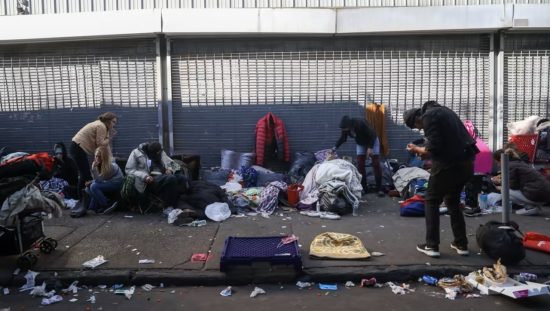Over the past decade, federal courts have consistently challenged executive branch actions. Most recently, the narrative has changed and the constitutional authority of the federal courts to stifle the executive orders has been questioned. While the Constitution does not directly articulate the presidential right to issue an executive order, the United States has a long history of using them as a means to make proclamations often relating to emergent situations requiring the president’s immediate attention. While executive orders of centuries past naturally look different from the executive orders we see today, they laid the groundwork and have helped to establish a crucial precedent for modern presidents. The Trump Administration’s recent executive orders, however, have not aligned with this precedent, and bipartisan discussions are viewing these orders as arbitrary attacks used to usurp constitutional checks and balances.
Because states have little power in curbing federal executive actions, they often reach for universal, or nationwide, injunctions, which are orders from a federal judge attempting to act against an executive action and impair its ability to be invoked for the entire country. These injunctions prevent the federal government from enacting and implementing a contested “law, regulation, or other policy.”
A recent Supreme Court ruling directly challenged Executive Order 14160, which seeks to abolish birthright citizenship for individuals born in the United States whose parents’ are not American citizens. A federal injunction, issued by a district court in Massachusetts on February 13, 2025, was filed against the order, placing a 30-day pause on its enforcement. However, on June 27, 2025, the Supreme Court ruled 6-3 to stifle the power of the lower courts to issue nationwide injunctions.
This decision will significantly impact executive actions moving forward, not just during the current Trump administration, but also during future presidential administrations, as it opens the floodgates for potential arbitrary and unchecked executive power. Judges across the United States will be unable to block executive orders and other federal policies– the effects of which will be felt on a global scale. It not only erodes and dismisses judicial power while swelling presidential authority, but completely contradicts the equilibrium of the three distinctly powerful branches of government the Founding Fathers intended. It dirties the water between authority within the branches and makes it unclear who yields the power, when they can use it, and when it can be stopped.
Trump, President of the United States v. CASA Inc.
In Trump v. CASA, the Supreme Court ruled that federal district judges may no longer grant nationwide injunctions against policies, lifting numerous nationwide blocks on executive orders. The lens of the case particularly focused on birthright citizenship and immigration policy, marking a win for the Trump administration. This decision is likely to shift how the administration exercises its power going forward, as the ruling curtails the bipartisan ability to curb legislation coming from the executive branch. Amid escalated political turmoil surrounding immigration policy, this ruling stirs concerns, not only relating to immigration, but also relating to the implementation of other executive policies that have been paused by lower court injunctions. The Supreme Court held that universal injunctions “likely exceed the equitable authority that Congress has given to federal courts,” and that federal courts are no longer authorized to issue universal injunctions under the Judiciary Act of 1789.
This decision signifies a significant loss for federal judges, as 25 national injunctions were filed in the first 100 days of President Trump’s second term in an effort to block Trump’s wave of executive orders. This includes, but is not limited to hindrances on White House policy regarding voting rules, information disclosure, federal employment, and federal funding. As universal injunctions are a key tool for federal courts to contradict executive branch administrative actions, particularly executive orders, the Court’s ruling will likely hurt many lower courts and permit the administration to operate with less concern for state push-back. Universal injunctions have served as the main line of defense against President Trump and his administration in halting the execution policy agenda components, such as Project 2025 and federal grant funding––namely because executive orders of this nature are in violation of many provisions within the Constitution––particularly those regarding congressional checks on executive power.
With this ruling, the Court acquiesced to the administration’s request for partial stays of the lower courts’ injunction. Justice Amy Coney Barrett, writing for the majority, asserted that the duty of the Executive is to follow the rule of law. However, she declared, the Judiciary does not have “unbridled authority” to enforce such duties, and at times, the law “prohibits the Judiciary from doing so.” In essence, the ruling establishes that no matter the constitutionality or legality of an executive policy, a federal district judge can no longer temporarily stop its enforcement on behalf of the entire country. The ruling comes in the wake of intense political turmoil and federal government operations, such as mass deportations and taxation cuts for the wealthy, that have been highly contested by not only policymakers and judges, but also by United States citizens. The decision leads the federal courts into uncharted territory, as their jurisdiction and checks on executive power have been severely limited.
At its core, the case is more procedural than substantive because it clarifies the power of the judiciary without providing specific limitations on particular policy issues, therefore not directly ruling on the issue of birthright citizenship. However, the judgement will now allow President Trump to expedite executive orders without congressional approval and face little to no opposition from the federal courts. It poses many questions about the future of partisanship in our federal government, as it indicates that if a president feels a bill will not pass through the bipartisan Congress, they can forgo traditional routes with minimal checks on their power.
The Implications of CASA As It Relates to Birthright Citizenship
Birthright citizenship is a legal principle within the United States that automatically grants citizenship to individuals when they are born. This can manifest in one of two ways: 1) ancestry-based citizenship, or jus sanguinis, or 2) birthplace-based citizenship, or jus soli. Ancestry-based citizenship, though less pertinent to the CASA case, extends citizenship to children born outside of the United States if their parents are United States citizens. Birthplace-based citizenship is conditional on the place of birth and refers to an individual’s “right of the soil.” The 14th Amendment of the United States Constitution states that “all persons born or naturalized in the United States, and subject to jurisdiction thereof, are citizens of the United States.”
Birthright citizenship is uniquely American in that it is not a common policy globally, and it has served as an integral part of expanding immigration rights within the states. As such, birthright citizenship and immigration policy have been a front-running divisive factor within politics for decades, with President Trump going so far as to make immigration the centerpiece of his second term in office. During his third campaign, President Trump declared that on “day one,” he would “launch the largest deportation program in American history,” therefore making the American promise of immigration and citizenship rights even more uncertain. This is why the ruling in Trump v. CASA is monumental, as it will allow for unabridged anti-immigration legislation to be produced from the executive branch, putting large populations at risk.
Additionally, the CASA case will manifest plentiful complications for plaintiffs moving forward who are attempting to gain relief from particular executive policies, stretching far beyond the scope of immigration. In her dissent, Justice Sonya Sotomayor made the bottom line of this ruling abundantly clear: “No right is safe in the new legal regime the Court creates.” Today, she explains, the threat is to birthright citizenship, but tomorrow, the threat could be to other divisive political issues, such as firearms or religion. The fight will not end with birthright citizenship and the inability of the courts’ to issue a universal injunction. Other cases, such as Loving v. Virginia, which established the right to interracial marriage, or Griswold v. Connecticut, which declared the right to contraceptives, could be on the chopping block. With the power of the courts being so limited, it is unclear whether or not President Trump could issue an executive order overruling these decisions.
What Now?
By restricting the ability to issue a universal injunction, the Supreme Court has made it far more labor-intensive to obtain broad and sweeping relief against unlawful government policies. Rather than federal judges filing all-encompassing injunctions, the impetus will now be on the individual to file a lawsuit or a class action suit. This case will drastically limit access to justice for individuals with fewer resources or the ability to seek legal counsel against executive initiatives. The American Immigration Council posits that until a change is made, “the amount of damage that could be done…especially around a fundamental constitutional right like citizenship, is extreme.” Alongside Justice Sotomayor in her dissent, Justice Ketanji Brown Jackson asserted that the ruling will “disproportionately impact the poor, the uneducated, and the unpopular,” namely those who do not have the means or resources to obtain a lawyer and who “often find themselves beholden to the Executive’s whims.”
As a result of the CASA decision, many Americans are finding themselves at a loss for solutions and optimism in the face of insurmountable adversity. While combative options have been substantially limited, there are still legal pathways for those who have been directly affected by unlawful executive orders to seek justice. Civil suits and class action suits are of course an option, but there are legal barriers surrounding these cases, therefore making the process far more laborious and time-consuming for the individuals involved than a judge filing a national injunction. However, non-partisan and independent organizations like Just Security offer a different route.
Just Security believes that plaintiffs should now seek APA Review under the new executive orders. APA, or the Administrative Procedure Act, is a federal law that governs how federal agencies develop and issue specific regulations. It outlines guidelines for rulemaking, procedures, adjudications, and how courts may review the agency’s behavior. Individuals seeking justice may use APA Review in birthright citizenship cases and other cases disputing unlawful executive procedures. Plaintiffs filing cases against actions that appear unconstitutional may add APA § 706(2) to their complaint, which would request that the challenged policy be classified as “not in accordance with the law.”Adding APA relief sets in motion a different area of legal actions against unconstitutional executive policies and is a substantiated alternative that an individual can use as a replacement for a universal injunction.
While there is no foolproof means to bypass the ruling of Trump v. CASA, many government organizations and non-governmental entities are working tirelessly to seek justice for individuals affected by the recent ruling. This will mark the beginning of a new era of litigation and opposition to executive policy. The power to curtail executive power was stripped from the courts, meaning that individuals directly impacted by executive orders will become far more reliant on legal agencies as well as the bureaucracy. This shift will set a new precedent for legal action taken against the federal government––the success of which is difficult to hypothesize. As we enter President Trump’s tenth month in office, the impact of this case poses questions for what executive orders and policies he may begin to roll out with virtually no means for state or federal opposition. At a time when the very fabric of our democratic political structure is at stake, an attack of this nature on our judiciary and right to representation within government is a threat that impacts all of us.



